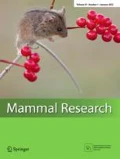The beginning
The history of Acta Theriologica is inextricably linked with that of its eminent founder, Professor August Dehnel (1903–1962), and the Mammal Research Institute of the Polish Academy of Sciences in Białowieża. The first issue of the journal was published in January 1955, by the Institute of Zoology of the Polish Academy of Sciences. In the same year, the Mammal Research Institute became an independent entity within the Department of Biological Sciences, Polish Academy of Sciences, and in 1958, it took over the publication of Acta. From the outset, Acta Theriologica aimed to be an international journal, with articles published in one of four languages: English, German, French and Russian. Since the 1970s, almost every article has been published in English. During the 60 years of its existence, Acta Theriologica has communicated over 2500 articles, including original papers, short notes and book reviews, submitted by researchers from six continents. A total of 59 regular volumes have been published since 1955, including seven special issues. Now, in 2015, we proudly present the sixtieth volume, which underlines the long and successful history of our journal.
The main transition
One of the most important moments in the history of Acta Theriologica was its transfer to Springer. In 2010, representatives of this publisher presented an attractive offer to the Editorial Board of Acta and since January 2011, the journal has been published by Springer on behalf of the Mammal Research Institute. This improved the visibility of the journal considerably, while facilitating the submission and handling of manuscripts. The composition of the Editorial Board was broadened and new editors were invited, mainly from regions that had been under-represented in the past, such as South America and Asia. All of this activity, combined with the efforts of the publisher to promote the journal, increased the number of good manuscripts that were submitted. This in turn led to an increase in the impact factor, which in 2014 reached its highest value so far (1.161).
The content
The scope of the research presented in Acta Theriologica is wide. It covers all aspects of wild mammal biology, including genetics, ecology, behaviour, bioenergetics, morphology, development, reproduction, nutrition, physiology, palaeontology and evolution. Special issues of our journal were devoted to ecology of the bank vole, ecological genetics of mammals, developmental homeostasis, evolution of shrews and population dynamics of small mammals. Some species found a special place in Acta, among them the European bison, which was the main subject of more than 120 papers that were published in the series Bisoniana. During its long history, the main focus of the journal has changed from morphology, bioenergetics, population dynamics and genetics to ecology and evolution of mammals. From the beginning, all the main groups of mammals have been represented in its pages, although special attention has been given to insectivores, rodents, ungulates and carnivores.
The editors
Despite the long history of Acta Theriologica, the managing editors have changed surprisingly rarely. Professor August Dehnel managed the journal from the beginning to his sudden death in 1962. Professor Zdzisław Pucek continued his mission until 2005, supported first by Dr. Marek Gębczyński and then by Dr. Bogumiła Jędrzejewska as Assistant Editors. Professor Jan Wójcik led the journal for the following 8 years and I myself took over as the Editor-in-Chief in 2013. All of my predecessors were not only splendid editors, but also eminent scientists, so I am honoured to continue their mission. Our Editorial Board has a wide range of expertise, covering different groups of mammals and disciplines. Support is provided by an international team of editors whose contribution is crucial in raising the quality and impact of research presented in our journal. They do an excellent job, not only by processing the manuscripts, but also by improving the quality of papers through constructive criticism. As Editor-in-Chief, I regularly receive letters from authors which acknowledge the effort of our editors.
The future
Two years ago, when I became Editor-in-Chief of Acta Theriologica, my priority was to increase its profile as one of the leading international journals dedicated to mammal research. We achieved this goal by promoting manuscripts which presented well-designed and cutting-edge studies. I have no doubt that the change of the journal’s name to Mammal Research will further increase the visibility and role of our journal. The success of this transition will require more hard work from myself and all of the editors, as we strive to maintain the high standard of the journal and encourage even more researchers to publish with us.


Karol Zub
Editor-in-Chief
Mammal Research
(formerly Acta Theriologica)
Author information
Authors and Affiliations
Corresponding author
Rights and permissions
Open Access This article is distributed under the terms of the Creative Commons Attribution License which permits any use, distribution, and reproduction in any medium, provided the original author(s) and the source are credited.
About this article
Cite this article
Zub, K. Sixty years of Acta Theriologica—transition to Mammal Research . Mamm Res 60, 1–2 (2015). https://doi.org/10.1007/s13364-014-0206-9
Published:
Issue Date:
DOI: https://doi.org/10.1007/s13364-014-0206-9

